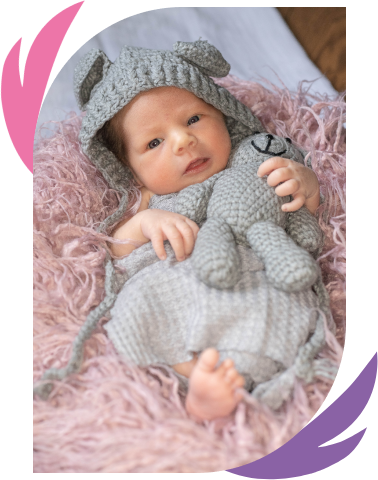
Egg donation is an amazing gift to families who need medical assistance to have children. It offers the chance to help bring a new baby to the world and build a new family. Besides, egg donor receive monetary compensation for their time, effort, and sacrifices.
Deciding to become an egg donor is a selfless act that provides hope to a lot of women (and men) who cannot become pregnant on their own. So if you have agreed to donate eggs and are wondering how you will inform your friends and family without getting negative reactions from them, there are many ways to go about the conversation. But before we proceed, let’s give you an overview of egg donation– what it means, its ethics, and the stigmas associated with donation – so you will know what it’s all about.
What is egg donation?
Egg donation occurs when a young woman undergoes part of the IVF procedure to have some of her eggs harvested, which she can then give out to another woman, medical research, or training. Learn about the complete donation process here.
Who is eligible to donate eggs?
Women have to be between the ages of 19 and 31 to qualify to donate eggs. Fertility clinics don’t usually allow older women to donate except in certain cases, i.e., if you are donating to a member of your family.
Prospective donors will need to undergo some tests before they are allowed to donate eggs. This is to ensure they don’t transfer any severe diseases or health conditions to the child or the intended mother.
Understanding the stigma surrounding oocyte donation
Nowadays, more and more people are growing their families with the help of assisted reproductive technology (or ART).
According to the CDC (centers for Disease Control and Prevention), around 1.7 percent of all US births every year involves ART. Due to their increasing popularity, fertility procedures like artificial insemination and IVF (In vitro fertilization) are no longer seen as taboo.
But not all fertility treatment options enjoy the same level of acceptance and understanding. One assisted reproduction method that is still stigmatized in many parts of society is the use of donor eggs.
Although it’s hard to understand why some people see oocyte donation as a taboo. The stigma may be because the procedure is relatively new compared to other infertility treatments. For instance, unlike artificial insemination that has been around since the 1950s, egg-donor conception just started getting popular in the last few decades.
Worrying about what people will say or think
One of the reasons donors hesitate to tell their friends and family is because they don’t want to be seen as greedy for donating their genetic material. A lot of donors are worried about what other people may think of their decision, and some fear that they may become an outcast or be called greedy. Remember, the decision to share this information is completely up to you.
Get your answers ready
At times, people can be careless or insensitive when asking personal questions. This insensitivity is not usually intended and does not imply that they are judging you negatively.
It’s normal for friends, family members, acquaintances, and colleagues to be curious when you tell them you’re donating eggs. Based on your specific circumstance and how comfortable you are, you should be prepared with some answers like:
- I had this strong desire to help those who want to build their own family, so I worked with a fertility expert to assist them.
- It’s actually an amazing journey. There’s so much I’d like to share, but that will wait because I have an appointment to catch.
Your privacy and desire to share matter most
You may need to provide more explanation depending on the situation. But your decision to donate eggs is actually a very personal one. So if you need to inform your professors or bosses why you want to have a day off or be absent in class, you may just tell them that you’re undergoing an outpatient medical procedure. Your fertility clinic will be able to provide you with a doctor’s note for any absences and the note will not detail why you need to be out. Whether or not you tell anyone about this is up to you because it is a personal issue.
Telling strangers or those you barely know is not the same as telling your family members or friends. This is why we recommend that donors consider many important factors when discussing this with their families.
- Ask yourself how supportive your friends or family will be about this decision?
- Do they love gossiping, or are your secrets safe with them?
- Do you fear that they might criticize you or form an opinion about you?
- Do they usually do that?
Egg donation is a delicate topic a lot of people would rather not talk about. If you decide to tell your friends and family you are donating eggs, be ready to receive different responses, such as criticism, acceptance, myths about the process, or some difficult personal questions.
It’s hard to know how your loved ones will respond to your decision since everybody has their own views regarding egg donation. It all comes down to the personalities of each individual. Remember not to let their opinion sway your decision or how you feel about it.
Commonly asked questions about egg donation
Get ready with answers to the questions your loved ones may ask when you tell them you are donating eggs. There are many myths flying around about donation. While it is not your job to educate the world about oocyte donation, you may want to debunk these false beliefs for your loved ones to put their mind at rest.
Why do you want to donate eggs?
You might want to tell your loved ones your motivating factors, such as your desire to help hopeful parents build or expand their families.
Is the process dangerous or painful?
The process is an outpatient procedure and takes around 30 minutes. There is a minimal risk of developing minor complications.
Will it affect your future fertility?
Egg donation won’t empty a woman’s egg pool or affect her ability to conceive in the future because just a few eggs are collected out of millions.
What are your or our responsibilities to babies resulting from your donation?
The legal documentation makes sure the Intended Parents have all the legal obligations and rights over the resulting children. The Egg Donor is not liable for the IVF outcome or babies born from her eggs.
How can I be of help?
Your friends and family can provide emotional support or practical assistance during the screening process and egg retrieval cycle. They can also help with transportation on the big day – the day of your egg retrieval. Having the support of your loved ones will make the donation experience more meaningful as you all come together to help another family.
It’s not that you are paid well to do practically nothing.
Egg donation is a very intense process that takes a lot of commitment, effort, and sacrifice. No amount of money can make up for the rigors and stress donors undergo.
Advantages of telling friends and family you are donating eggs
1. Emotional Support
Your friends and family members can be your support system during the egg donation process. You can tell them your feelings, worries and receive valuable advice from them. If you have people you can trust with your whole heart, they can be your backbone and make the process easier for you.
2. Helping a Family in need
When you give out your eggs, you are helping another family bring a new life to the world. But technically the resulting baby will have a genetic tie with you. So, you need to know this fact before making your decision.
The thought of this can be emotionally challenging for some people, and it helps to be surrounded by supportive friends and family members during these times.
Take Away
At Lucina Egg Bank, we advise that donors revealing their decision to donate eggs to people they trust and know will have their back. However, if you decide to share your donation experience, be prepared to get both positive and negative responses.
If you have made up a mind to proceed with this incredible gift, apply right away with us. Find out if you qualify within just 72 hours. Unlike a fresh egg donation, you can donate with us as soon as you are selected without having to match with an Intended Parent.












